Hullabaloo

Brief Synopsis
Cast & Crew
Edwin L. Marin
Frank Morgan
Virginia Grey
Dan Dailey Jr.
Billie Burke
Nydia Westman
Film Details
Technical Specs

Synopsis
Frank Forrest Merriweather, an unemployed Vaudevillian actor with mounting debts, goes to radio station AJN's New Talent Bureau to audition his histrionic talents. Frank fails to get an audition, but meets young Laura Merriweather, another rejected performer, who thrusts Frank upon Talent Bureau Vice-President Bob Strong and insists that he let Frank show him his "dramatic novelty." Bob, a professional golfer, resents having been forced to become a "swivel-chair jockey" by his manipulative sweetheart Wilma, whose father, Arthur Jay Norton, heads the Talent Bureau at the station. Realizing that his only ticket out of the radio business is to come up with a great novelty radio show, Bob hires Frank to perform his one-man show, in which he impersonates all twenty characters in a fake news broadcast about invaders from Mars. When Frank neglects to interrupt his "Battle of the Planets" broadcast with advertisements, the hoax results in nationwide panic and he is fired. Desperate to get his job back, Frank courts the widowed Lulu Perkins, who is a part-owner with her brother-in-law, Clyde Perkins, of the radio station's richest sponsor. While doing his impersonation of Charles Boyer for Lulu, Frank is visited by one of his three ex-wives, Arlene, and is shocked when she introduces Laura as his estranged daughter. Shortly after, Frank's second wife Sue appears with their daughter Judy, demands an alimony payment and calls him a "road company Casanova." Before Frank can explain the situation to the bewildered Lulu, Penny, his third wife, arrives with their son Terry. While Frank's ex-wives conspire to marry Frank to the wealthy Lulu in order to get their alimony money, Frank develops an affection for his grown children and joins them in recreating the song and dance numbers that their mothers performed with him in the past. Frank then promises never to leave his children again and always to be a real father to them. When Judy, Laura and Terry learn that Frank is broke, they band together and decide to get their father back on the air. Laura goes to AJN to tell Bob how angry she is with him for firing her father, but as soon as she realizes that Bob is leaving the company, she takes back her accusations and accompanies him to an amusement park. After Bob and Laura fall in love, Bob decides to take his job back and reinstate Frank's show. In the meantime, however, Frank's ex-wives delight in Frank's decision to marry Lulu, and the newspapers carry their wedding announcement. Later, Bob, with the help of Frank's celebrity voice impersonations, tricks Clyde into letting him have his show back and the wedding is called off. Just as the show is about to return to the air, Frank steps up to the microphone to introduce his show and then impersonates the voices of Clark Gable, Spencer Tracy and Claudette Colbert in his rendition of a scene from the movie Boom Town . Because Perkins has withdrawn his sponsorship of the show, Frank advertises his own prouduct, "Jing," and calls from druggists soon light up the radio station's switchboard. When Perkins takes a drink of "Jing," he becomes drunk and signs the Merriweather family to a five-year contract. The show is a hit, and Frank closes it with a big finale that includes his three children.

Director
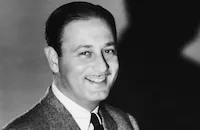
Edwin L. Marin
Cast
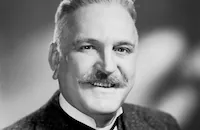
Frank Morgan

Virginia Grey

Dan Dailey Jr.

Billie Burke
Nydia Westman

Ann Morriss
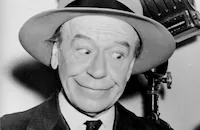
Donald Meek
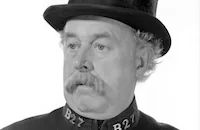
Reginald Owen
Charles Holland
Leni Lynn

Virginia O'brien

Curt Bois

Sara Haden
Larry Nunn
Barnett Parker
George Lessey
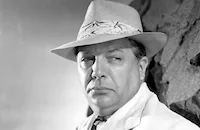
Cy Kendall

Connie Gilchrist
Kay St. Germaine
Mike Frankovich

Arthur O'connell
Tom Seidel Daley
Terry Ray
Jimmie Lucas
Marty Faust
Sherry Hall
Tim Ryan
David Lloyd
Sidney Miller

Karen Verne
John Wald
Charles Lacey
Bruce Mitchell

Leo Gorcey
John Sheehan
Elvida Rizzo
Morton Scott
Ralph Mccullough
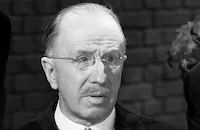
Arthur Hoyt
Crew
Leo Arnaud
George Bassman
Earl Brent
Val Burton
Stephen Foster
Sam H. Stept
Eddie Imazu
Ted Koehler
Charles Lacey
Jack Lawrence
Charles Lawton
Sammy Lee
Ruggiero Leoncavallo
Paul Marquardt
Conrad A. Nervig
Nat Perrin
Bradford Ropes
Ted Shapiro
Douglas Shearer
Louis K. Sidney
Georgie Stoll
Dolly Tree
Robert Van Epps
Edwin B. Willis
Dorothy Yost
Dolph Zimmer

Film Details
Technical Specs

Articles
Hullabaloo

Hullabaloo
Virginia Grey (1917-2004)
She was was born in Los Angeles on March 22, 1917, and was exposed to the film industry at a very young age. Her father, Ray Grey, was a Keystone Cop and acted in several other of Mack Sennett's comedies with the likes of Mabel Normand, Dorothy Gish and Ben Turpin. When her father died when she was still a child, Virginia's mother encouraged her to join the acting game and audition for the role of Eva for Uncle Tom's Cabin, a big budget picture for Universal Studios in the day. She won the role, and acted in a few more pictures at the studio: The Michigan Kid and Heart to Heart (both 1928), before she decided to temporarily leave acting to finish her schooling.
She returned to films after graduating from high school, and after bouncing around Hollywood doing bits for various studios, she hooked up with MGM in 1938. Her roles in her first few films were fairly non-descript: In Test Pilot and Ladies in Distress (both 1938), she did little more than look pretty, but in the following year she had scene-stealing parts in The Women (upstaging Joan Crawford in a delicious scene as a wisecracking perfume counter girl) and as the suffering heroine in Another Thin Man (both 1939).
Despite her versatility (she could handle comedy or drama with equal effectiveness), MGM would cast her in some above-average, but hardly starmaking movies: Whistling in the Dark, The Big Store (both 1941), and Tarzan's New York Adventure (1942). She left MGM in 1943 and became a freelance actress for several studios, but her material as a leading lady throughout the '40s were mediocre: Swamp Fire, House of Horrors (both 1946), and Mexican Hayride (1948) were sadly the more interesting films in her post-MGM period. But by the '50s she was a well-established character actress, appearing in fairly big-budget pictures: All That Heaven Allows, The Rose Tattoo (both 1955), Jeanne Eagels (1957).
In the '60s, Grey turned to television and found work on a variety of hit shows: Wagon Train, Peter Gunn, Bonanza, My Three Sons, I Spy, and several others; plus she also captured a a couple of notable supporting parts in these films: Madame X (1966), and Airport (1970), before retiring completely from acting in the early '70s. She is survived by her sister, Lorraine Grey Heindorf, two nieces and two nephews.
by Michael T. Toole
Virginia Grey (1917-2004)
Quotes
Trivia
Notes
Hullabaloo was the first producing effort of veteran radio and theater executive Louis Sidney. This picture also marked the film debuts of actors Leni Lynn and Virginia O'Brien, and black radio tenor Charles Holland, who was under radio contract to NBC. In the picture, Frank Morgan does voice impersonations of film stars Al Jolson, Ted Lewis, Wallace Beery, Robert Taylor, Mickey Rooney and Hedy Lamarr. Morgan's "Battle of the Planets" sequence and the national panic that it inspires is reminiscent of Orson Welles' "War of the Worlds" radio hoax, which was broadcast on the Mercury Theatre on the Air on October 30, 1938. In the film, Morgan also impersonates the voices of Clark Gable, Spencer Tracy and Claudette Colbert in his rendition of a scene from M-G-M's Boom Town (see below), a film the studio released three months prior to Hullabalo, and in which Morgan also appeared. Hollywood Reporter pre-release news items indicate that production on the picture was held up for two days due to musical number rehearsals. While the Hollywood Reporter review states that the film is "probably the worst bowl of hash which ever came off the M-G-M lot," and blames its failure on a "miserable script and a pinch-penny production," the Motion Picture Daily review calls the film "unorthodox and giddy, but funny to the point of hysterics."
The file for the film in the MPAA/PCA Collection at the AMPAS Library contains a letter from the PCA to M-G-M, in which the studio was warned to "get away from the suggestion that Merriweather has had three wives, and, as a consequence, three sets of children." The PCA insisted that this aspect of Merriweather's character would surely "give great offense to motion picture patrons in all parts of the world, because of its suggestiveness as a travesty of marriage." As an alternative, the PCA suggested that Merriweather have only one wife with one large brood of children. M-G-M also received requests by the PCA to omit suggestive language and questionable gags from the script, as well as the verse "I'm just a snake-in-the grass; A two-time lassie who is so untrue," which appears in the first verse of the song "Hullabaloo." Modern sources note that Hullabaloo was one of the first films to show a television set as home furniture.















